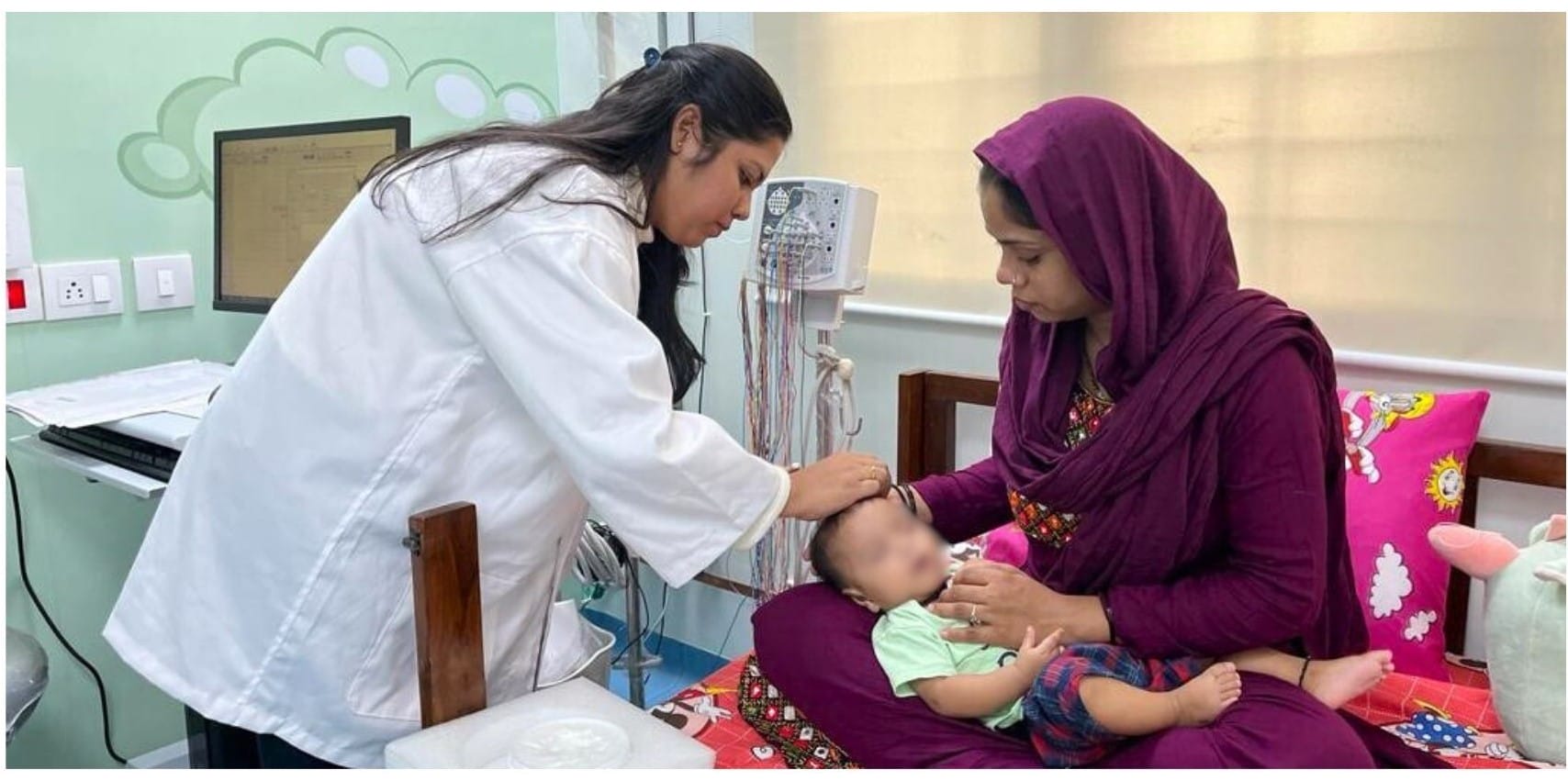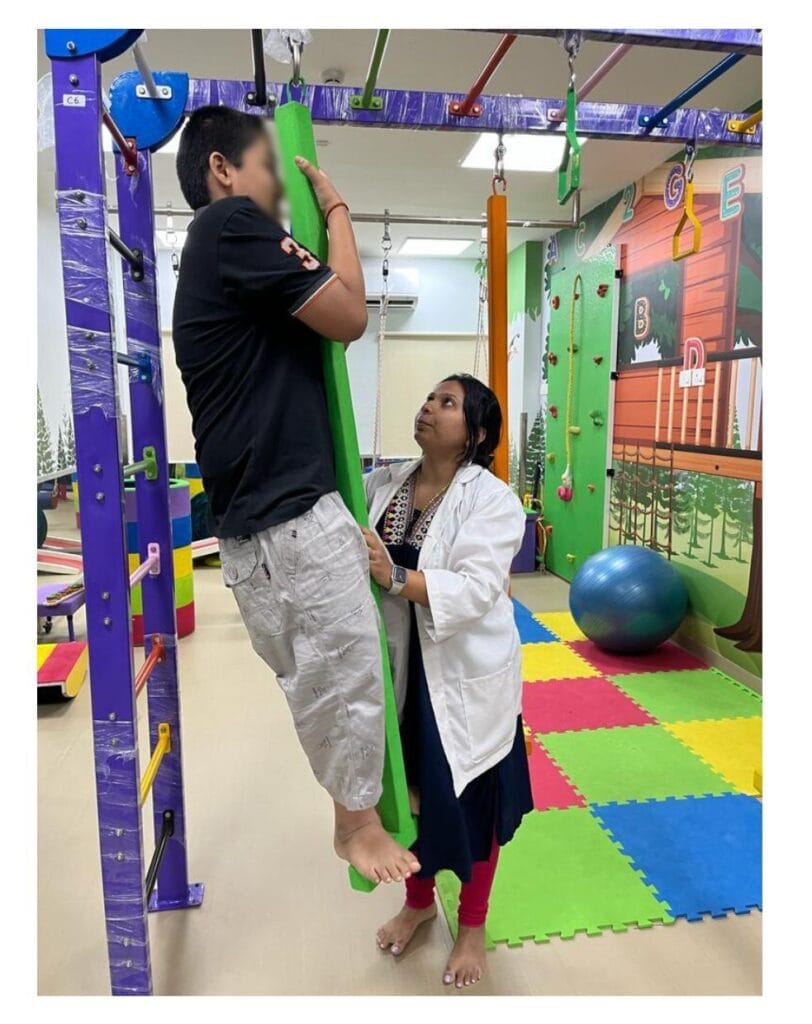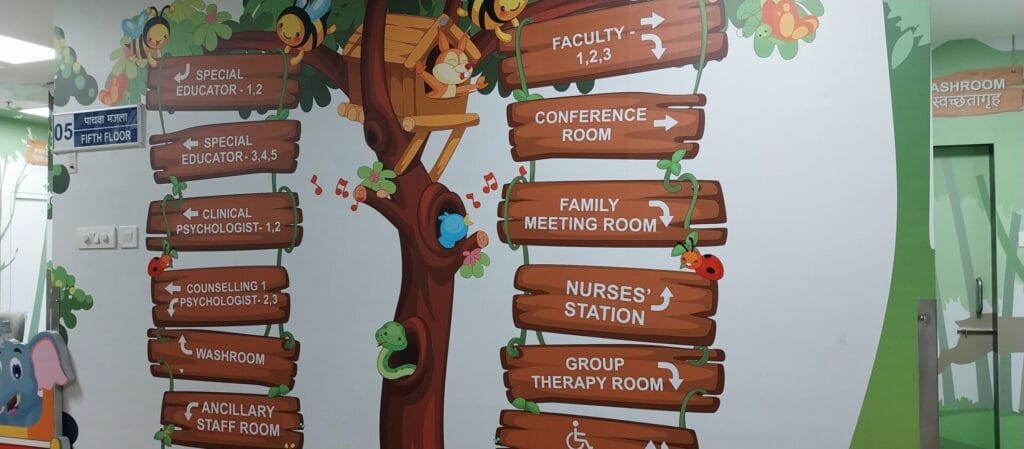“I found it challenging to adhere to the doctors’ instructions due to the constant rotation of different doctors during each visit. It led to confusion in managing my hyperactive daughter, who tends to become angry quickly,” said Kavita Shinde, a resident of Dahisar in Mumbai. Kavita’s 8-year-old daughter Hansika has been diagnosed with attention deficit hyperactivity disorder (ADHD) and has visited B.Y.L Nair Hospital, Mumbai Central in Mumbai for treatment for the past three years.
Kavita was relieved after she moved to the recently established Early Intervention and Rehabilitation Centre for Children at Byculla. She has been consistently meeting the same doctor at the centre for the past few months, making it easier to follow the instructions and it has been easier on her and her daughter.
Like Kavita, many parents experience the same relief at the centre. The Brihanmumbai Municipal Corporation (BMC) established the Early Intervention and Rehabilitation Centre for children with physical and mental disabilities at Nagpada in Byculla, operating under B.Y.L Nair Hospital. The centre offers facilities for children aged 0 to 18. All the treatments are provided free of cost.
Addressing multiple issues of children
The state-of-the-art centre encompasses nine specialities within a single facility, including paediatric, psychiatry, physiotherapy, occupational therapy, speech therapy, dentistry, orthopaedics, ENT, and ophthalmology.
Dr Surabhi Rathi, Professor and Head at the department of Paediatrics** at Nair Hospital, says “We have designed the centre to provide parents with all the necessary services in one location, ensuring high quality and timely assistance.”
Dr Surabhi further explains that a child with autism or cerebral palsy needs more than one therapy. Certain services like occupational and speech therapy are available at other BMC hospitals. For instance, if a child with cerebral palsy requires a consultation with a special educator, parents must take them to another BMC hospital. Carrying these kids is challenging for parents and especially so if they are using public transport.
Consequently, they often opt for private treatment. Consultation with a private special educator costs more than Rs.1000 per session, adding to the financial burden on parents. As a result, parents often discontinue the necessary therapies.

Emphasising the importance of having multispecialty services under one roof, a doctor from the centre shared an example: “We have a child with cerebral palsy, who experiences seizures. We consulted the paediatric department, where necessary tests were conducted and medication was prescribed. Recognising developmental delays and observing vision issues during occupational therapy, we promptly referred the child to the ophthalmology department on the same floor. They conducted examinations, and the ongoing treatment is underway. Due to the child’s weak muscles and inability to walk, we referred him to physiotherapy. This way, the child conveniently receives almost three types of therapies in one place.”
Operating on an appointment basis, each department eliminates long queues, reduces waiting time for parents. They can manage two to three therapies in a single day, reducing travel costs and saving time, said Dr Henal.
Read more: Treatment at charitable trust hospitals inaccessible for the poor in Mumbai
Child-friendly equipment and environment
Unlike many therapy centres in BMC hospitals, which cater to both adults and children, this five-storey centre exclusively focuses on children.
Decorated with distinct themes such as jungle and marine, the therapy equipment is specially designed for children, ensuring that the therapy sessions are enjoyable rather than tedious. Dr Henal Shah, a professor at Nair Hospital and the centre’s coordinator, emphasises that this is a child-friendly centre, not a hospital. The atmosphere, complete with toys, allows children to enjoy their surroundings without the typical apprehension of hospitals.

BMC has appointed associate professors in each department, who specialise in paediatrics. So all the therapies are provided under the supervision of paediatric experts.
Dr Surabhi mentioned that the centre offers advanced tests such as Electroencephalograms (EEGs) free of charge, while private institutes typically charge over Rs 8,000.
While the centre was officially inaugurated last month, it has been operational since July 2023. It registered over 1000 new patients and extended services to more than 12,000 existing patients affiliated with Nair Hospital.
Fighting stigma around mental health
Dr Surabhi highlighted that as a multi-specialty centre, this facility plays a crucial role in dispelling the stigma surrounding mental illness. Often, a child with a physical disability also requires psychological consultation, but parents frequently decline. However, as a multi-specialty centre, parents can consult in the psychiatry department.
Another unexpected fallout of mental health challenges in children, is reluctance of private dentists to treat the children, who may not be able to sit for the duration of the treatment. Parents find limited options for the dental care of their children. “Through collaboration with psychiatry and other departments, we can effectively manage and provide dental care for these children in the centre,” said Dr Frank Mehta, associate professor at the dental department.
Read more: KEM hospital experience shows what unplanned medical expenses mean for the masses
Parenting issues
Dr. Vinyas from the psychiatry department explained, “We assess the parents and children separately, and most often, we identify parenting issues as a significant concern.”
Doctors said parents themselves may have mental health issues, which impact the child’s psychology apart from family conflicts. Dr Swati from the psychiatry department mentioned, “We refer such parents to Nair Hospital for further treatment.”
The doctors also highlighted that 70% of children exhibit gadget addiction, and this is often associated with family or school issues, as well as other mental health concerns.
Diagnosing psychological issues requires in-depth interactions, typically two to three times. As a dedicated centre, the psychiatry department allocates the necessary time for this process. Doctors have observed instances where children were misdiagnosed with autism. Psychologists also provide training to parents to address these parenting challenges.
Regular follow up
The centre has appointed a Community Development Officer for following up with parents to ensure compliance with the treatment. Additionally, the centre also employs a social worker, who assists parents in accessing government schemes.
Dr Sudhir Medhekar, the dean of Nair Hospital, says, “Currently, many patients at this centre are referred from Nair Hospital. Enhancing awareness about the centre is crucial so that general practitioners and private doctors can refer to parents who may not afford treatment in private setups.”
Need for additional rehabilitation centres
“I get appointments in more easily at this centre rather than Nair Hospital. However, there is still a considerable waiting time in the Occupational Therapy (OT) department,” says a mother of a seven-year-old girl, who did not wish to disclose her identity. “I approached them, but they informed me that I have to wait for a few months.” Despite the dedicated centre, some facilities, like occupational therapy, have a waiting list of over 250.
Ideally, each child requires OT thrice a week, lasting 45 to 60 minutes. However, due to the lengthy waiting period, the centre can only provide once-a-week sessions for each child, which are limited to 30 minutes. Dr Pratima mentioned that they trained parents in such cases and told them to take exercises at home or refer them to the nearest OT centre.

Highlighting the population density of Mumbai and the Mumbai Metropolitan Area, Dr Henal stressed the necessity for multiple centres to provide intensive care and rehabilitation facilities for these children.
Dr. Henal says the next phase involves the introduction of telemedicine. This initiative aims to guide other centres and extend care to patients outside of Mumbai.
On the inaugural day of the centre, chief minister Eknath Shinde announced plans to establish rehabilitation centres in both eastern and western suburbs of Mumbai. If this proposal comes to fruition, Kavita Shinde won’t have to worry about commuting with her daughter from Dahisar to Byculla twice a week.
| * The Early Intervention and Rehabilitation Centre, Jehangir Boman Behram Road, Nagpada, Mumbai Central, Mumbai, Maharashtra 400008. * The centre operates on weekdays from 9 am to 4 pm and on Saturdays from 9 am to 1 pm. Parents or relatives can visit the centre directly for consultations or treatments. * This comprehensive facility includes specialised departments in psychiatry, paediatrics, orthopaedics, ophthalmology, Ear, Nose, and Throat (ENT), paediatric dentistry, physiotherapy, occupational therapy, and audio and speech-language therapy. * All these services are provided free of charge. |
Errata: The designation of Dr Surabhi Rathi has been corrected since the first version was published.